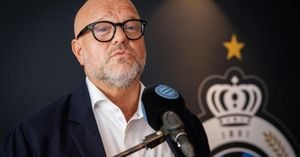Borussia Dortmund is embarking on a transformative path, signaling its commitment to streamline administrative operations and improve decision-making efficiency. Following the team's convincing 6-0 victory over Union Berlin, Managing Director Lars Ricken spoke with enthusiasm about the recent restructuring measures intended to alleviate the much-criticized "Elefantenrunde"—a term familiar to passionate football fans and clubs alike.
On February 23, 2025, during his post-match interview with Sky Germany, Ricken expressed relief and excitement not only for the team's performance but also for what this victory signifies: substantial progress toward more effective management at Dortmund. Referring to the traditional gatherings described as the "Elefantenrunde," he bluntly stated, "We don’t need a ‘committee zoo’"—a nod to the club's inequality and sometimes chaotic decision-making practices.
Historically, these meetings gathered high-ranking officials—including Ricken, Sporting Director Sebastian Kehl, Technical Director Sven Mislintat, and even former CEO Hans-Joachim Watzke. Such high-profile discussions had become synonymous with inefficiency, leading to the club's current administrative challenges. Ricken noted the problems stemming from having "too many bosses" and the bureaucratic bottlenecks created by cumbersome monthly meetings.
With Mislintat's recent dismissal and Watzke's prior retreat from the limelight, much has changed at Dortmund. Ricken conveyed his views on the new direction: “The ‘Elefantenrunde’ will not exist anymore,” signifying the end of lengthy discussions where decisions would often stall rather than progress. This administrative shake-up aims to facilitate quicker, more meaningful conversations, focusing on actionable strategies rather than prolonged deliberation.
Looking forward, Ricken has set up what he describes as "a completely normal meeting structure". Now, key players like Kehl and head coach Niko Kovac will engage regularly and directly, ensuring their insights not only inform strategies but also lead to swift, concrete actions. The establishment of daily exchanges among these stakeholders marks the beginning of a more agile management framework detectable by fans and analysts alike.
The repercussions of Ricken's decision to clarify and adjust Borussia Dortmund's internal structures are palpable, especially considering the club's aspirations to compete not just nationally but within European arenas. The performance against Union Berlin served as both a victory on the pitch and a reprieve for the club's administration, poised now to function with newfound clarity and purpose.
Questions remain, of course. How will this transformed communication model impact Borussia Dortmund during demanding times? Will this restructuring translate to consistent success on the pitch? Ricken has hinted at optimism, stating, "We are constantly exchanging ideas and strategies," reflecting confidence not just in the technical leadership, but also the shared vision moving forward.
Sebastian Kehl, collaborating closely with Ricken and Kovac, affirms the significance of less bureaucracy, saying it allows him to focus more on training and less on committee meetings. With their combined leadership, Borussia Dortmund looks to re-establish dominance not only within the Bundesliga but with ambitions stretching across the European footballing community.
Industry analysts and fans alike have expressed cautious optimism about these changes. Indeed, many are awaiting tangible results from this new model. Could this be the moment Borussia Dortmund revitalizes its fortunes both administratively and competitively? Only time will tell.
What is clear is the reality: Borussia Dortmund is no longer willing to sit back and accept the status quo. Under Lars Ricken's stewardship, fundamental shifts are taking place to reshape the club's identity and its operation's efficacy. With freshly energy-driven tactics and newfound resolve, BVB is ready to recommit to excellence both on and off the pitch.



